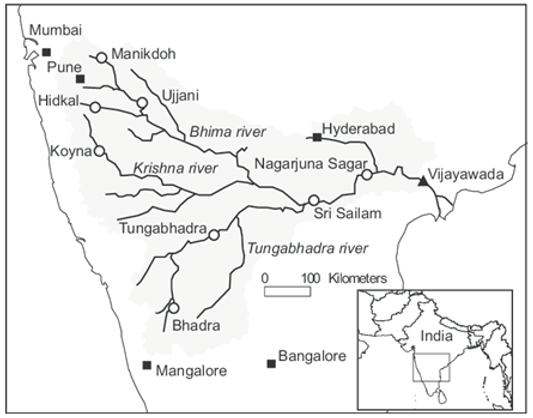

19th February 2022 (6 Topics)
Context
The Supreme Court recently asked if the States of Telangana, Andhra Pradesh and Karnataka could amicably settle their quarrel over the allocation of the Krishna river water.
About
About Krishna Water Dispute:
- A dispute over the sharing of Krishna waters has been ongoing for many decades, beginning with the erstwhile Hyderabad and Mysore states, and later continuing between successors Maharashtra, Karnataka and Andhra Pradesh.
- In 1969, the Krishna Water Disputes Tribunal (KWDT) was set up under the Inter-State River Water Dispute Act, 1956, and presented its report in 1973.
- The Tribunal divided the 2060 TMC (thousand million cubic feet) of Krishna water at 75 per cent dependability into three parts.
- The second KWDT was instituted in 2004.
- Second KWDT gave a report in 2010. According to this, the available water is allocated based on 65 % dependability, by considering the data of flow of water of the past 47 years.
- However, Andhra Pradesh challenged it through a Special Leave Petitionbefore the Supreme Court in 2011.
- In 2013, the KWDT issued a ‘further report’, which was again challenged by Andhra Pradesh in the Supreme Court in 2014.
Constitutional Provisions and powers of state and central Governments:
- Legislative powers are divided between the states and central governments.
- According to the article 246 seventh schedule of the constitution consists of three lists of subject matters. They are :
- Union List
- Concurrent List
- State List
- State governments have more powers about the subject matters present in the State List and the parliament has powers to make laws about the subject matters present in the union list.
- The central government has powers to make laws about the subject matters present in the concurrent list.
- By Entry 17 Water is in State List:Water, irrigation and canal, water development and Storage are a state subject.
- By Entry 56 Water is in Union List:Regulation and development of water under the control of the union is declared by parliament by law to be expedient in the public interest.
- Article 262explicitly grants parliament the right to legislate over the matter in Entry 56 and also gives primacy over the Supreme Court.
- Legislations: Two legislations which are relevant to the interstate water disputes Act 1956 and the River Boards Act 1956.
- Both of these acts are introduced along with the states reorganization act of 1956. The two acts are in response to the corresponding provisions in the constitution.
- The Interstate Water Disputes Act 1956 (ISDA) was in response to the article 262, which stipulates that the parliament should make necessary laws to adjudicate disputes between states over interstate waters.
About Krishna River:
- Krishna River is third longest river in India after Ganges and Godavari Rivers.
- It flows in the following states starts in Maharashtra and joins in Bay of Bengal.
- The principal tributaries joining Krishna are the Ghataprabha, the Malaprabha, the Bhima, the Tungabhadra and the Musi.
- Starts At:Mahabaleswar, Maharashtra
- Ends At:Hamasaladeevi, Andhra Pradesh.
- Total Length of the River: 1,400 kms.
- The following map shows entering the Krishna River into the Bay of Bengal.
Major Dams constructed across Krishna River:
Some of the projects are for irrigation purposes and some projects are for both irrigation and for the generation of power.
- Dhom Dam, Maharashtra
- Basava Sagar Dam, Karnataka
- Almatti Dam, Karnataka
- Srisailam Dam, Andhra Pradesh
- Nagarjuna Sagar Dam, Andhra Pradesh
- Prakasham Barrage, Andhra Pradesh
|
Inter-State River Water Disputes Act, 1956
|
More Articles



